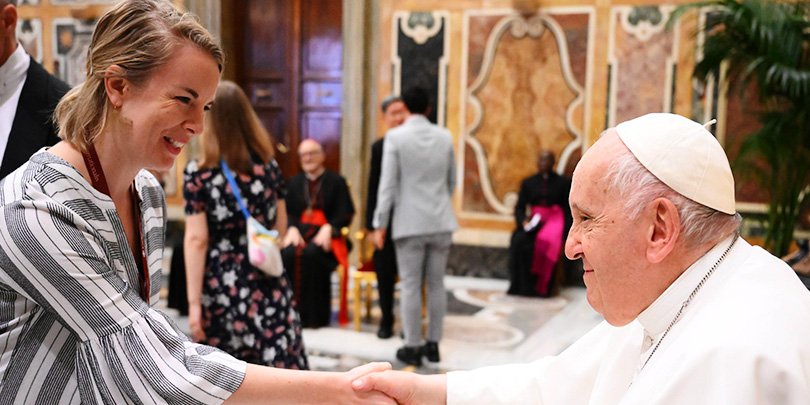How did you get into the humanitarian aid and development sector?

From an early age my parents exposed me and my sisters to a diverse range of people and cultures. I loved meeting new people, learning about their culture and way of life.
Through this, I saw the impacts of government corruption, disasters and environmental issues, conflict, and colonisation. I recognised the opportunity and privilege in my own upbringing and felt compelled to use this position for good, so I studied theology, intercultural studies, community development and international development.
My work life weaves together Australian based community development and disaster response, and international aid and development. Knowing I wanted to enter the aid and development sector I spent some time volunteering in Greece working with survivors of human trafficking and refugees alongside completing a master’s in international development.
How does your work connect with your personal values and faith?
I’ve always been inspired by the life of Jesus and the way he journeyed with people. One thing I love about Caritas Australia is the focus on locally led programming. We recognise that people have the knowledge and expertise to lead their own development, but sometimes lack the opportunity to do so. Our is to come alongside and support communities as they determine what it means to develop and thrive. This echoes the approach of Jesus; he did not force or tell people what to do but would meet them where they are at and walk alongside them.
What do you find the most challenging about working in aid and development?
We only need to turn on the TV to see there is a lot of need around the world. Systems are broken, people are hungry, conflict abounds, nature and the environment are struggling. There are times when this need can feel insurmountable.
What do you find the most surprising about the work you do?
The courage, tenacity, and joy of people. From my colleagues at Caritas Australia who continuously serve and give to others, to the partner staff I work alongside in the Pacific who navigate the impacts of climate change on their own family yet daily show up for the broader community and work to find solutions and build resilience, to the young woman who spends evenings studying while the kids are sleeping in hopes of creating a better future for them, or the young man who traverses multiple countries to find a life for his siblings that is free of conflict.
It is when I encounter people that I am reminded of love that permeates through the world, making the insurmountable problems seem that little bit smaller.
Do you have a career highlight you can share?
I spent some time teaching basic computer skills and English language to survivors of human trafficking. One woman I worked with had never seen a computer before. It felt scary to even open a laptop, with all she had been through she was not sure she could even learn a new skill anymore. As classes progressed, her confidence grew, and her skills developed. These successes helped to rebuild her confidence and empowered her to find safe and secure employment which she loves. The opportunity to journey with someone is a privilege I will never take for granted.
What’s your advice for aspiring humanitarians?
Say yes – if you have the means and opportunity to gain experience in the sector through study, secondments, and internships, then go for it.
Meet people in the sector – connect on linked in, join networks like “Women in Aid and Development”, ACFID (the Australian Council for International Development) often runs an ‘intro to the sector’ event.
Keep learning – take on a stretch project at work, listen to podcasts (The New Humanitarian, Good Will Hunters are some), and read widely – the sector is constantly evolving.


